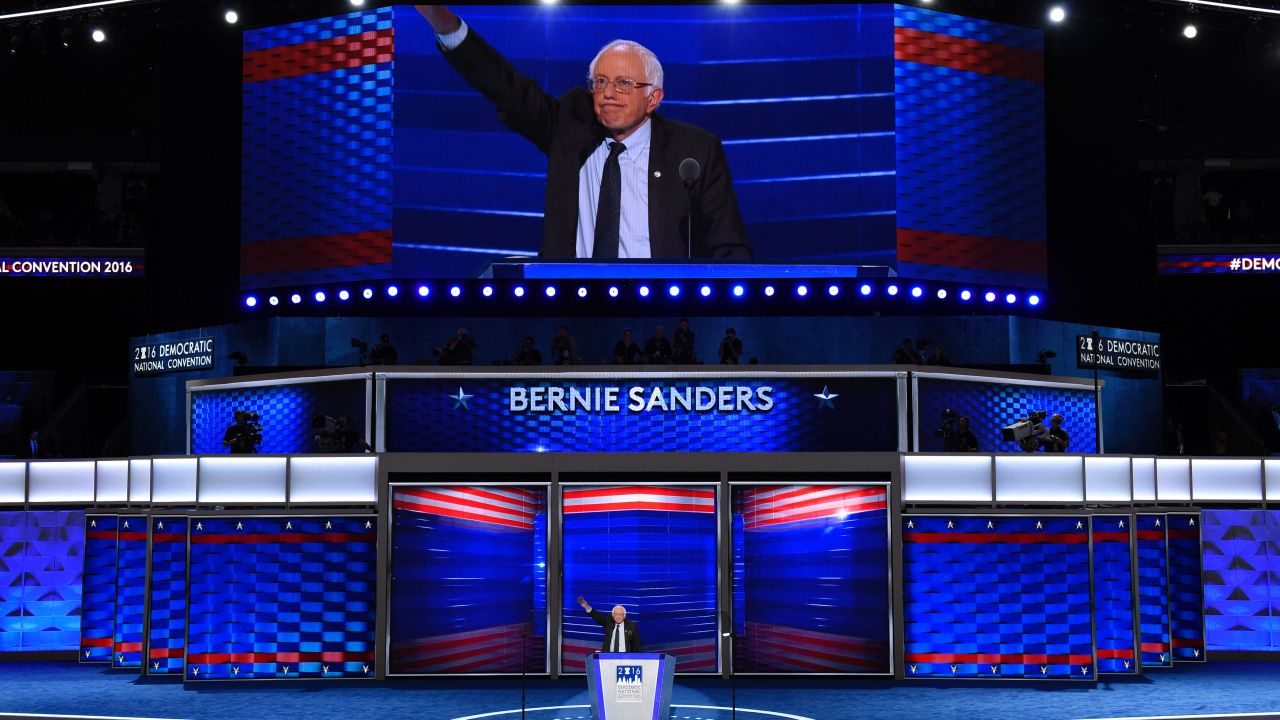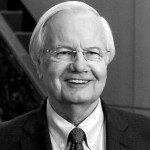
Former Democratic presidential candidate Bernie Sanders waves before leaving the stage after speaking at the Democratic National Convention at the Wells Fargo Center in Philadelphia on July 25, 2016. (Photo by Saul Loeb/AFP/Getty Images)
Shoot if you must these old grey heads, but these two semi-qualified observers of the passing political scene watched Monday night’s proceedings at the Democratic National Convention and saw past the heckles and opprobrium of the leather-lunged few. Instead, we witnessed an evening of progressive rhetoric and thoughtfulness unseen on a big political stage since the days of William Jennings Bryan, Wisconsin’s “Fighting Bob” La Follette, “Happy Warrior” Al Smith and the crusaders of FDR’s New Deal. Not to mention Hubert Humphrey, Jesse Jackson, Shirley Chisholm and a host of others who though history kept beating the drums for ordinary people against the organized might of Big Money.
Progressive big hitters were out on the field Monday, and they successfully swung for the fences. Michelle Obama, Elizabeth Warren and Bernie Sanders were batting like the Yankees’ legendary Murderers Row, aided and abetted by such powerful players as Reps. Keith Ellison (D-MN) and Raúl Grijalva (D-AZ), Philadelphia Mayor Jim Kenney and US Sen. Jeff Merkley (D-OR).
Michelle Obama was elegant and forceful as she looked back at her family’s years in the White House and endorsed Hillary Clinton. “I want someone with the proven strength to persevere,” she said. “Someone who knows this job and takes it seriously. Someone who understands that the issues a President faces are not black and white and cannot be boiled down to 140 characters. Because when you have the nuclear codes at your fingertips and the military in your command, you can’t make snap decisions. You can’t have a thin skin or a tendency to lash out. You need to be steady, and measured, and well-informed.”
Could anyone watching not feel a tingle down the spine as this remarkable woman traced the great arc of American history? We only prayed grandchildren were listening as she said that the story of America is “the story of generations of people who felt the lash of bondage, the shame of servitude, the sting of segregation, but who kept on striving and hoping and doing what needed to be done so that today, I wake up every morning in a house that was built by slaves — and I watch my daughters — two beautiful, intelligent, black young women — playing with their dogs on the White House lawn. And because of Hillary Clinton, my daughters — and all our sons and daughters — now take for granted that a woman can be president of the United States.”
Elizabeth Warren did what only she can do, deconstructing the charade that is Donald Trump
“Trump thinks he can win votes by fanning the flames of fear and hatred,” she said. “By turning neighbor against neighbor. By persuading you that the real problem in America is your fellow Americans — people who don’t look like you, or don’t talk like you, or don’t worship like you… That’s Donald Trump’s America. An America of fear and hate. An America where we all break apart…
“When we turn on each other, bankers can run our economy for Wall Street, oil companies can fight off clean energy, and giant corporations can ship the last good jobs overseas. When we turn on each other, we can’t unite to fight back against a rigged system. Well, I’ve got news for Donald Trump. The American people are not falling for it.”
And then the hour belonged to Bernie Sanders. As he endorsed Clinton, he was gracious in defeat:
“I understand that many people here in this convention hall and around the country are disappointed about the final results of the nominating process. I think it’s fair to say that no one is more disappointed than I am.
But to all of our supporters — here and around the country — I hope you take enormous pride in the historical accomplishments we have achieved.
“Together, my friends, we have begun a political revolution to transform America and that revolution — our revolution — continues.
Election days come and go. But the struggle of the people to create a government which represents all of us and not just the 1 percent — a government based on the principles of economic, social, racial and environmental justice — that struggle continues.
And I look forward to being part of that struggle with you.”
Then and there, the old socialist from Vermont liberated Democrats to be the champions of everyday people again.
If only — and it’s a big if — if only the party can liberate itself from the stranglehold of Big Money. For off camera, out of sight and (for the moment) out of mind, one could sense the corrupting presence of the lobbyists of corporate America, the bag men of special interests, and the mercenaries there in Philadelphia with hefty infusions of campaign cash eager to bring the Democrats down from the ramparts of Les Mis and back to cold, cynical earth.
Monday, we saw spirit and passion, ideas and aspirations, inspiring language, diversity (1,182 black delegates as opposed to the GOP’s 18, and 2,887 women), values, even the tears of Bernie’s supporters and yes, the willingness to join forces to defeat Trump. But those progressive voices ringing out so beautifully that night are the very ones fighting to free their party from the grip of millionaires and billionaires while at the same time the Clinton forces embrace the one-tenth of one percent represented by the multibillionaire and former Republican Mayor of New York Mike Bloomberg. He speaks at the convention on Wednesday night, part of the Clinton effort to give moderate members of the GOP another reason to dump Trump. Nonetheless, the optics are less than great.
We took time from the grace notes of unity and collaboration sounded at the convention to look over those Democratic National Committee emails dumped on the eve of the convention by WikiLeaks, communications that reveal just how low party fundraisers will stoop for cash, promising contributors access to the White House and other higher ups in exchange for their donations. In The Washington Post this week, Matea Gold wrote, “The leaked emails reveal the relentless art of donor maintenance that undergirds the system: the flattery, cajoling and favor-bestowing that goes into winning rich supporters. It’s a practice that the party fundraisers themselves often find dispiriting.”
To which Nicholas Confessore and Steve Eder at The New York Times added, “As is common in national politics, Democratic staff members kept detailed track of every dollar contributed by targeted donors, aiming to get each of the wealthiest givers to ‘max out,’ or contribute the maximum legal amount to each party account. The biggest national donors were the subject of entire dossiers, as fundraisers tried to gauge their interests, annoyances and passions.”
Avarice is bipartisan, as has been seen at both this year’s Republican and Democratic conventions. For the first time, both parties received no public money for their conventions so they were completely beholden to private funding. What’s more, Democrats reversed previous policy and lifted a ban on corporate and lobbying dollars to pay for their big soiree. “After those limits were lifted,” Matea Gold noted, soon-to-be-former DNC Chairwoman Debbie Wasserman Schultz “and other top party officials showered corporate lobbyists with calls, emails and personal meetings seeking convention support and PAC contributions to the party, according to a spreadsheet logging the contacts.” This year’s sponsors include Lockheed Martin, Home Depot, AT&T, Xerox, Twitter, Microsoft and Facebook.
While in Philadelphia, according to Confessore and Eder, “Donors who raise $1.25 million for the party — or who give $467,000 — are entitled to priority booking in a top hotel, nightly access to V.I.P. lounges and an ‘exclusive roundtable and campaign briefing with high-level Democratic officials,’ according to a promotional brochure obtained by The Times.”
And then there’s this report by Megan R. Wilson at The Hill:
Presumptive Democratic nominee Hillary Clinton has accepted more than $9 million in bundled donations from registered lobbyists, while the DNC has rolled back the lobbyist bans that Obama put into place.
“‘In 2008 and 2012, there was no integration with the [Obama] campaign,’ said Al Mottur, a senior Democratic lobbyist at Brownstein Hyatt Farber Schreck, adding that he would have liked to have helped. ‘Now, the campaign is welcoming — they’re open to us. That’s why I’ve done as much work for her as I’ve done on her behalf.’”
It’s an old story. Candidates seek the votes of citizens only to turn around and promise the only real access to donors. And once again representative government is disrupted because the winners so rarely govern as they campaigned. They can’t, because they are tethered to the demands, claims and tendered IOUs of the rich and privileged.
That the system is so rigged has been a major theme of the Sanders campaign, and on Monday, it was reiterated by both Sanders and Warren as each called for the overturning of Citizens United and other court decisions that have flooded politics with money at a level beyond imagination.
In her acceptance speech Thursday night, Hillary Clinton doubtless will say similar things and praise the progressive gospel of campaign finance reform, professing to shun the appeasement of Wall Street — the big banks, hedge fund managers and private equity oligarchs.
All well and good, but if her actions and her party’s continue to prove otherwise, the rousing rhetoric of this week — and the historic nomination of the first woman as a presidential nominee — may fade to insignificance as an angry, disillusioned, and despairing public opens the door wide for the phony “I’m so rich I can’t be bought off” gospel of Donald J. Trump. Caveat emptor.





